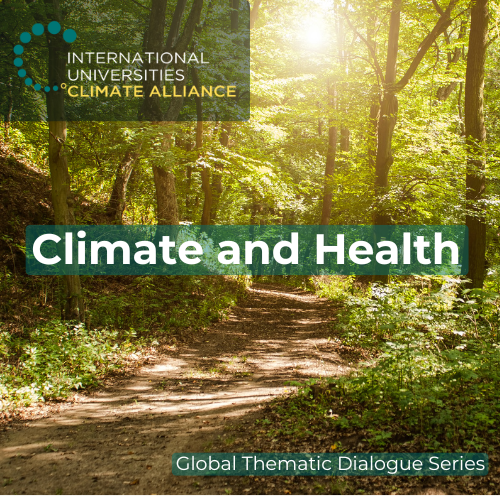27 March 2025
The opening event of the 2025 Global Thematic Dialogue Series centred on the topic of climate and health. Across two one-hour virtual sessions, eight case studies from various regions around the world were shared, offering a diverse and multifaceted view of current global perspectives.
The dialogue convened academics, students, non-profit leaders, NGO members, and government researchers, with registrations received from over 80 universities and organisations from 33 countries.
About the Sessions
The two sessions were chaired by leading researchers in the discipline; the International Universities Climate Alliance is grateful to Associate Professor Fiona Haigh from UNSW Sydney for expertly drawing out key ideas presented in session one, and Professor Nicky Morrison from Western Sydney University for her expertise in crafting a coherent narrative through session two.
Participants heard presentations of topical case-studies from Dr Jirair Ratevosain (Duke University, USA); Isabella Lenihan-Ikin (University of Oxford, UK); Dr Kirk Douglas (The University of the West Indies, Barbados); Andrea Lobato (UNICAMP, Brazil); Prof. Nicky Morrison (Western Sydney University, Australia); Professor Xiaoqi Feng (UNSW Sydney, Australia); Dr SanYuMay Tun (University of Oxford, UK); and Dr Nikolaus Mezger (Karolinska Institutet, Sweden). Professor Lara Dugas (University of Cape Town, South Africa) had prepared a case-study but was unable to join, so an overview is included here.
Dialogue summary
A key focus for the climate and health dialogue was the role universities can play in addressing health impacts of climate change. The case studies shared during the sessions provided a snapshot of current thought in this space, and two themes emerged. The first was a consideration of how universities serve as role models, embedding sustainability into curricula, as well as considering the physical spaces they occupy. The second theme addressed the unique position of universities to serve as a nexus to create impactful solutions, engaging with communities, governments, and policy-makers, as well as documenting the impact of climate change on health through research. Presentations drew on concrete examples of how climate change is necessitating a rapid intervention to ensure healthy populations, and the role of universities in understanding the challenges faced as well as opportunities for action.
Universities as role models
The urgent need, globally, to embed sustainable practices into medical teaching and training, emerged across several presentations.
